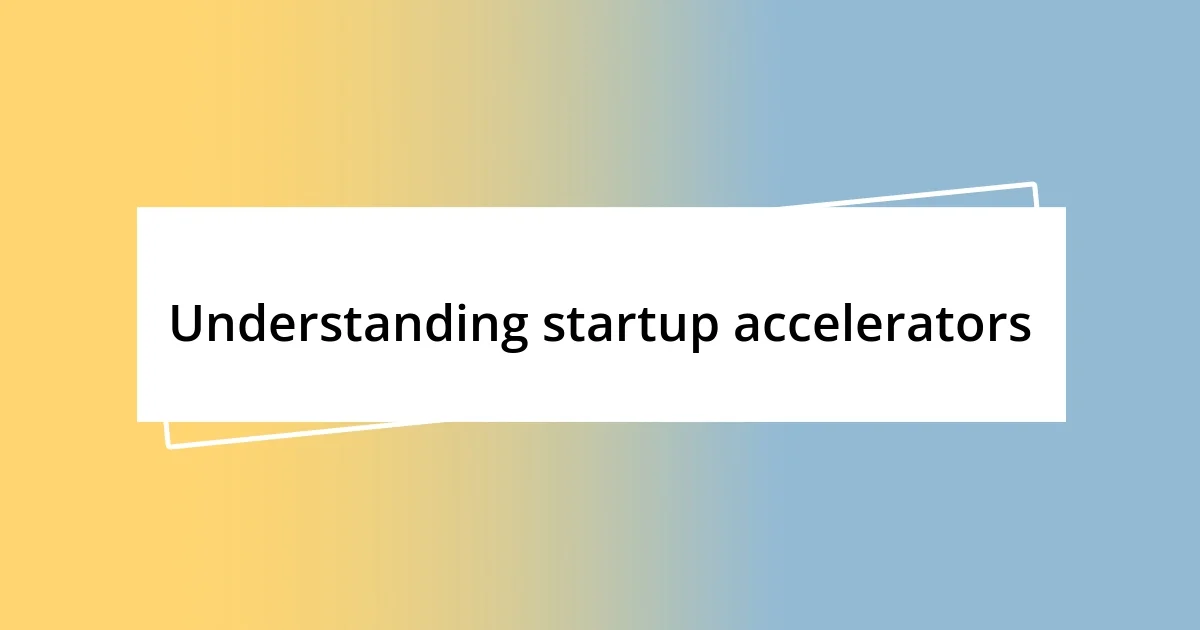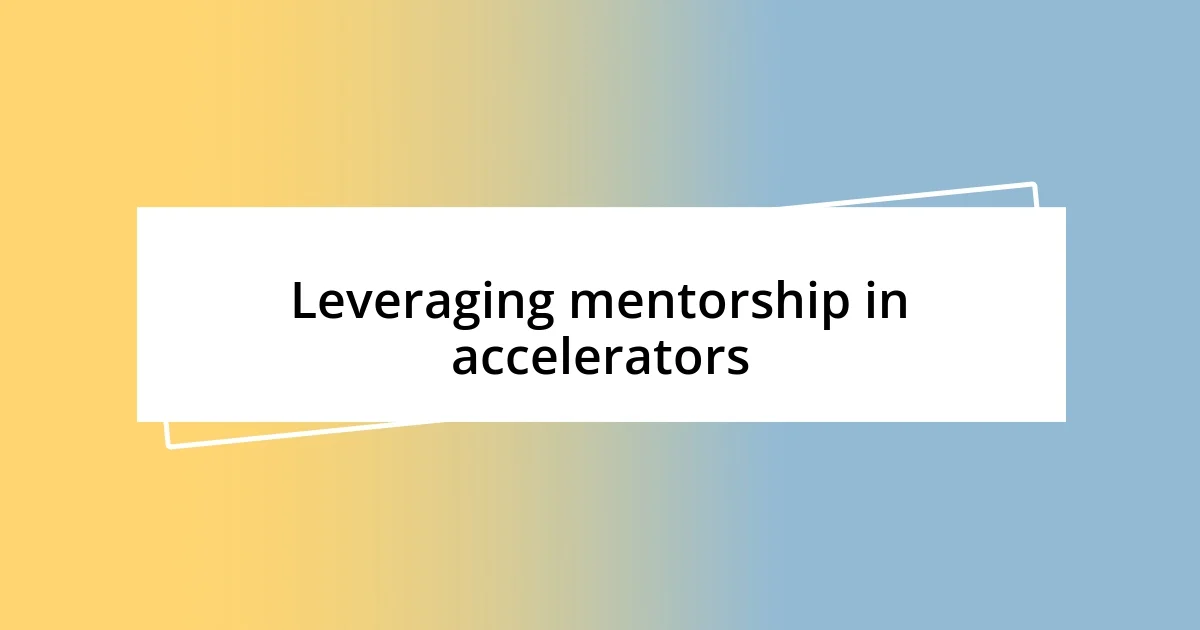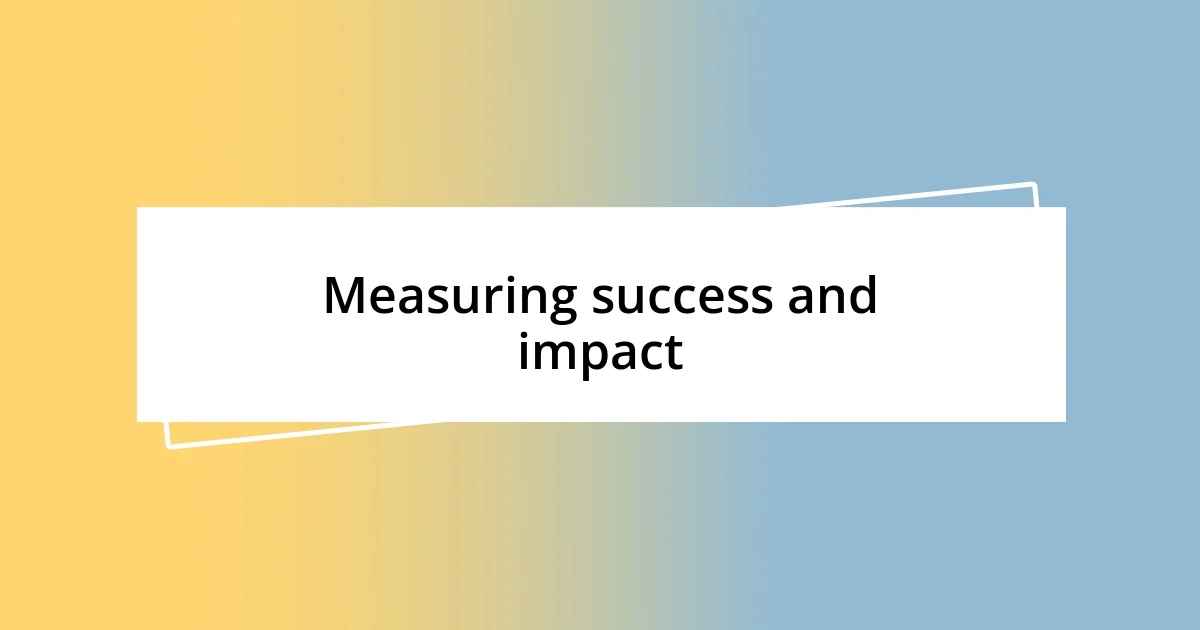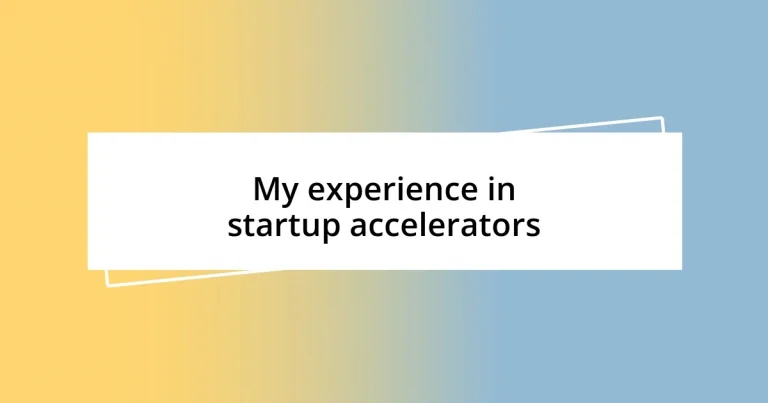Key takeaways:
- Startup accelerators provide essential resources, mentorship, and community support, crucial for rapid business growth and overcoming challenges.
- Choosing the right accelerator involves evaluating industry focus, mentorship quality, and post-program support to ensure alignment with startup needs.
- Life after an accelerator requires maintaining connections, setting personal milestones, and celebrating progress to navigate the transition effectively and sustain momentum.

Understanding startup accelerators
Understanding startup accelerators is essential for any entrepreneur looking to scale their business quickly. I vividly remember my first encounter with an accelerator; the energy in the room was palpable. It was a mix of excitement and nervousness as founders pitched their ideas, hoping to catch the attention of mentors and investors. Can you imagine standing in front of seasoned entrepreneurs, your heart racing, as you lay your vision bare?
These programs often provide invaluable resources that extend beyond just funding. I found that the mentorship offered was a game-changer; I received direct feedback and advice that helped refine my business model. Think about how many successful startups have been through these programs—what if your idea could be the next big thing?
One of the most impactful aspects of a startup accelerator, in my experience, is the community it fosters. Collaborating with like-minded individuals who are just as passionate as you can turn obstacles into shared challenges. Have you ever felt overwhelmed by the sheer scale of a venture? In those moments, knowing that you have a network to lean on can be incredibly reassuring.

Choosing the right accelerator
Choosing the right accelerator can feel daunting, but it’s crucial for your startup’s success. I remember sifting through countless programs, each claiming to offer the best support. The energy in the accelerators I attended varied significantly; some felt more like a boot camp while others had a more relaxed environment. I realized that the culture of an accelerator could really influence how I connected with mentors and fellow entrepreneurs.
When evaluating options, consider the industry focus. I initially overlooked this aspect, only to find that an accelerator tailored to my sector provided not only relevant mentorship but also access to investors who were genuinely interested in my space. It’s like finding the right puzzle piece; once I made that connection, everything clicked into place, driving my momentum forward.
Another vital aspect is the post-program support. Some accelerators offer a robust alumni network and ongoing resources, while others fade into the background after the demo day. In my experience, an accelerator that continued to check in and provide guidance after the program ended was invaluable. It’s reassuring to know that support doesn’t just stop once you leave the incubator.
| Criteria | Questions to Consider |
|---|---|
| Industry Focus | Does the accelerator specialize in your industry? |
| Mentorship Quality | What is the track record of mentors in the program? |
| Post-Program Support | What ongoing resources and networks do they provide after graduation? |

Preparing your application effectively
Preparing your application for a startup accelerator is more than just filling out forms—it’s about crafting a compelling narrative that resonates with your audience. I remember feeling overwhelmed by all the details, but I soon realized that telling my story authentically was key. Focusing on my journey, challenges, and aspirations vividly illustrated why my idea mattered. Authenticity, combined with clarity, not only helps your application stand out but also reflects your passion and commitment.
To streamline the process, consider these essential steps:
- Know Your Audience: Research the accelerator’s values and mission to align your vision with theirs.
- Highlight Your Team: Showcase the strengths of your team members; investors want to see capable and passionate individuals.
- Define Your Metrics: Be specific about benchmarks you’ve achieved and future goals you aim to reach.
- Articulate Your Value Proposition: Clearly explain what problem your startup solves and why it matters now.
- Keep It Concise: Present information in a clear, concise manner; avoid jargon that might alienate your readers.
Ultimately, your application isn’t just a document; it’s an opportunity to demonstrate your enthusiasm and readiness to take the next big step. In my experience, embracing this mindset transformed my approach and ultimately enhanced my application’s impact.

Maximizing networking opportunities
Maximizing networking opportunities is one of the most rewarding aspects of being in a startup accelerator, and my experiences here truly shaped my journey. One evening, during a casual mixer, I struck up a conversation with a fellow founder that led to a surprisingly fruitful partnership. Those informal moments often breed the best connections, as people let their guard down and share ideas freely. Have you ever found unexpected inspiration in a simple chat? I certainly did, and it opened doors I hadn’t even considered.
I learned early on that actively participating in workshops and networking events is crucial. The more I engaged, the more I learned how to present my startup compellingly. At one pitch night, I saw how other entrepreneurs captivated their audiences. Inspired, I took notes on their techniques, which ultimately shaped my own pitch style. It reminded me that every interaction is a learning opportunity, and I approached networking with curiosity rather than just a transactional mindset.
Remember, leveraging these experiences means following up. After meeting a brilliant investor during a panel discussion, I sent a thank-you email and offered to share more about my startup’s journey. To my surprise, not only did he respond positively, but he also set up a coffee meeting for deeper conversation. It made me realize that building relationships isn’t just about the initial handshake; it’s about nurturing those connections with intention and authenticity. How do you plan to follow up after making those valuable connections?

Leveraging mentorship in accelerators
Mentorship in startup accelerators can be a game-changer, and I speak from experience when I say the right guidance can ignite your growth trajectory. I recall a moment when a seasoned mentor offered insights that shifted my perspective entirely. Their experience in navigating funding hurdles made me rethink my approach, and I felt a renewed sense of confidence. Have you ever had someone guide you through a challenging situation? That kind of support can truly illuminate your path.
One crucial aspect of leveraging mentorship is the willingness to be vulnerable. I remember feeling apprehensive at first about exposing my startup’s weaknesses, but the trust I built with my mentor deepened our relationship. In turn, this openness attracted invaluable feedback that helped refine my product. It’s remarkable how a mentor’s willingness to share their own experiences can create a safe space for you to explore your challenges and ideas. How comfortable are you with seeking feedback on your vulnerabilities?
Equally important is the need to actively apply what you learn from mentorship. I made it a point to take notes during our sessions and implement the suggested strategies promptly. When I tried out a new customer outreach tactic that my mentor advised, the results were striking. The increase in engagement made me realize that mentorship is not just about receiving advice; it’s about transforming those insights into actionable steps. This dynamic interaction has motivated me to seek out mentors who push me to innovate and grow. Are you ready to take those steps to turn mentorship into meaningful action?

Measuring success and impact
Measuring success in a startup accelerator can be quite nuanced, as it often goes beyond simple metrics like funding or user growth. I found that reflecting on the relationships formed and the knowledge gained was equally important. For instance, after completing my program, I realized that the ongoing connections I cultivated were as valuable as any financial gain. Have you ever considered how your network can be a measure of success?
I often assess impact through the lens of personal growth. I remember a pivotal moment during a feedback session when I received constructive criticism on my business model. Initially, it stung; however, it later became a catalyst for dramatic improvement. Learning to embrace feedback and adapt became a true marker of my journey. What challenges have pushed you towards growth in unexpected ways?
Lastly, I learned that the real measure of success lies in the transformation of ideas into actionable plans. After several weeks of guidance, I took a leap and pivoted my startup’s focus based on insights I gathered. This decision led to a significant uptick in engagement and user satisfaction. Isn’t it fascinating how a shift in strategy can redefine success? I believe that reflecting on these moments not only clarifies our progress but also fuels our potential moving forward.

Life after the accelerator program
Navigating life after an accelerator program can be both exhilarating and daunting. For me, the transition was filled with mixed emotions; while I was excited about the prospects ahead, I often found myself grappling with uncertainty. I vividly recall the first few weeks after completing the program—having the knowledge but feeling lost without the structured support. Have you ever underestimated the value of that cohort experience? The camaraderie, the shared pressure—suddenly, it felt like I was floating without a life raft.
One of the most profound lessons I learned post-accelerator was the importance of maintaining connections. I’ve had several enlightening coffee chats with fellow participants, and each conversation has reignited my passion for my startup. Just the other day, a peer recounted how their business shifted focus after sharing insights with me. It struck me: these informal interactions are gold. They’ve not only spurred new ideas but also reminded me of the power of community. Isn’t it remarkable how sometimes, a simple chat can lead to a breakthrough?
Despite the challenges, I found an unexpected rhythm in the chaos. I began to set personal milestones, breaking down my larger goals into bite-sized, achievable tasks. Reflecting on those moments, I remember celebrating small wins—like gaining my first customer after the accelerator. Each success, no matter how minor, has reinforced my resilience. How do you celebrate your progress? I believe it’s essential to recognize those steps forward as they lay the foundation for the bigger picture ahead.














